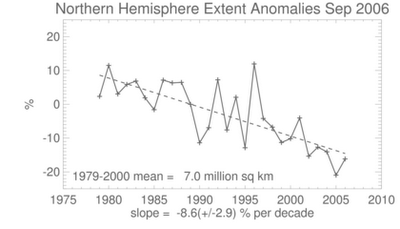The western world has amassed a huge ecological debt over the last 30 years according to the most recent WWF Living Planet report. In 2003 the global human population used 25% more natural resources than the planet could replenish. However in western countries like the UK and NZ the per capita figure is more like 200% (i.e. we would need 3 planets for all of us to live like the UK population does in perpetuity). This growing ecological debt will eventually lead to a catastrophic collapse of the entire world ecosystem -- and according to the WWF's biannual Living Planet Report that could happen as early as the middle of this century.
Of course the exact length of time an ecological breakdown on a global scale may take to unfold is very difficult to estimate, but the fact of global over-consumption seems clear. The timing of ecological collapse may be uncertain, but at the rate we are consuming, the end point is inevitable unless we begin to consume in a sustainable way.
There have been five previous mass extinction events in the history of life on Earth. The last was 65 million years ago, bringing to an end the age of the dinosaurs. Right now, in our lifetimes, the activities of the human population could well bring about the sixth mass extinction event in Earth's billions of years of history.
According to the Living Planet Report, terrestrial land species have declined by 31% between 1970 and 2003. In the same period the human population has almost doubled from 3.7 billion to over 6 billion people. There is no doubt that many of these species will recover is we learn how to curb our demanding appetite for resources. The question really is whether we will be able to agree that a solution to this problem is necessary and worthy of our undivided attention.
Read this BBC
article for more information about the Living Planet Report.
Its virtually impossible to report on this kind of thing without feeling depressed. We are living in a time of amazing scientific and technological breakthoughs, unprecedented access to information and despite these facts the global population exhibits an even more amazing collective denial and wishful distrust of the growing body of scientific evidence. There was a previous time in human history when the population grew fat, lazy and blind to their own shortcomings. It was the decline and fall of the Roman Empire. Here is a short quote from one set of theories about what brought about this decline:
The Roman economy was basically Raubwirtschaft, plunder economy, which was based on looting existing resources rather than producing anything new. The Empire relied on booty from conquered territories (this source of revenue ending, of course, with the end of Roman territorial expansion)
This theory seems plausible to me, but for alternative theories about the decline of the Roman Empire feel free to check out this
article.



